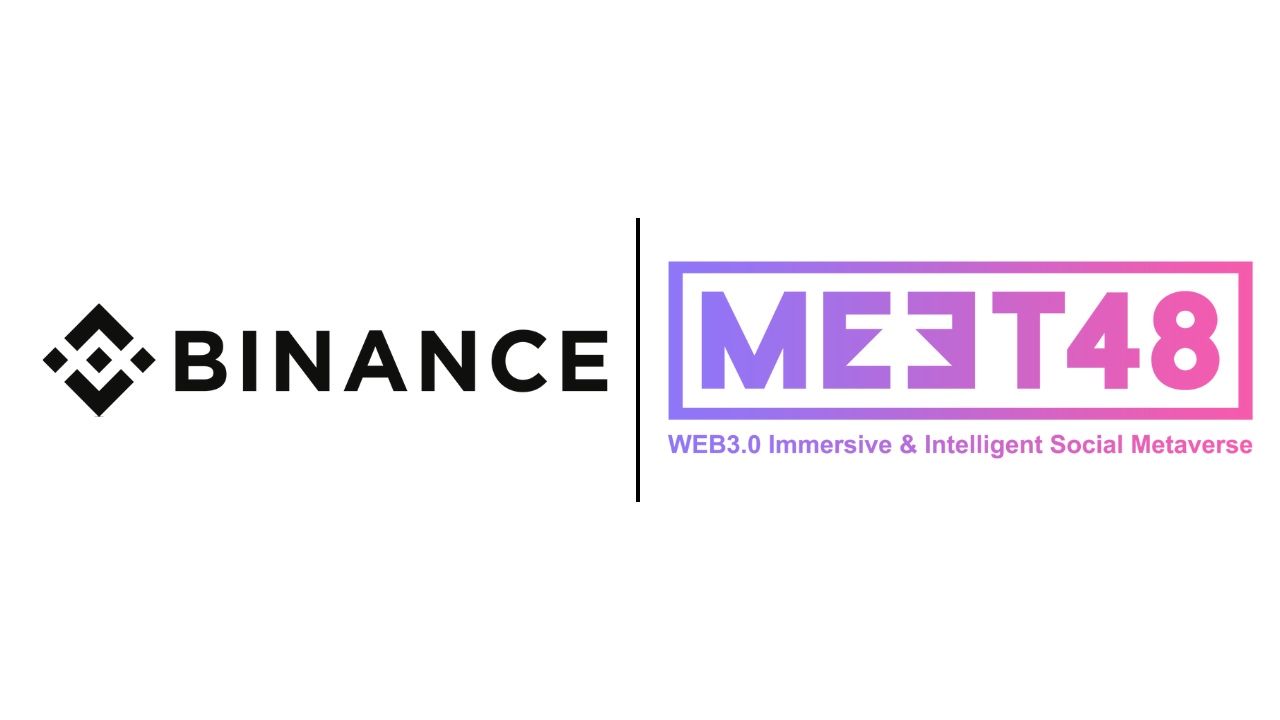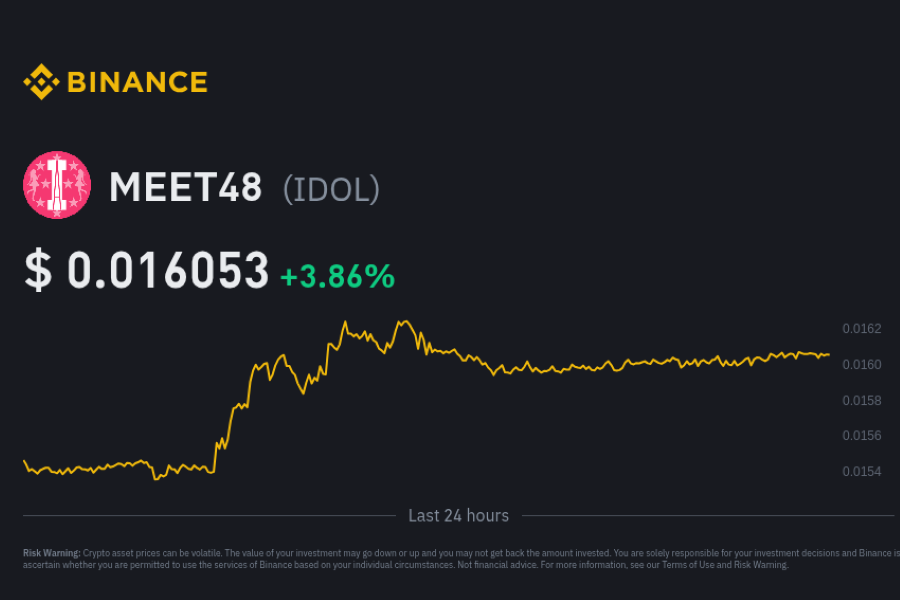Binance Picks MEET48 for Strategic Investment

The $300 billion idol industry is about to collide with blockchain.
In a strategic move that few saw coming, crypto exchange giant Binance has placed a significant bet on MEET48, an emerging Web3 entertainment platform focused on virtual idols. The investment, made through its venture arm YZi Labs (formerly Binance Labs), signals serious institutional interest in digital performers.
But should we believe the hype around virtual celebrities? Or is this just another crypto solution searching for a problem?
Can AI Popstars Fix Entertainment's Fan Problem?
Fans spend billions supporting their idols. They get almost nothing in return.
Think about the last time you purchased concert tickets, merchandise, or premium content from your favorite performer. Where did your money actually go? Probably not to building any meaningful ownership or influence in the entertainment you love.
This one-way relationship defines the modern entertainment industry. Fans pay. Companies profit. The cycle continues.
MEET48 thinks blockchain can break this pattern.
"Traditional entertainment treats fans as wallets, not partners," explains Wayne Zhang, MEET48's Harvard-educated founder. "We're rebuilding this relationship from the ground up, giving fans actual ownership stakes in the virtual idols they support."
How exactly?

Instead of passive consumption, MEET48 enables active participation. Fans purchase IDOL tokens to vote on creative decisions, from music style to performance details. Their engagement earns them NFT collectibles granting exclusive access rights. The more they participate, the greater their governance power and financial rewards.
And unlike traditional fan clubs where benefits exist at the company's discretion, these rights are encoded on the blockchain. Unchangeable. Verifiable. Truly owned.
But does the world really need blockchain-based virtual popstars?
AI Meets Blockchain: The Technology Behind Digital Celebrities
MEET48 isn't just slapping blockchain on existing entertainment models. They're building something genuinely new.
At the platform's core sits a sophisticated AI system combining motion capture, voice synthesis, and emotional intelligence algorithms. These technologies allow virtual idols to perform in real-time, interact naturally with fans, and improvise during live events.
Sound impressive? It is.
But the real innovation happens when this AI meets blockchain. Each virtual idol exists as a tokenized entity on BNB Chain. Their performances, merchandise, and personality traits become digital assets fans can partially own and influence through governance mechanisms.
Need to see how this works in practice?
When virtual idol "Mina48" plans a new album release, token holders vote on everything from genre to visual aesthetics. Fans who participate most actively receive fractional ownership in the album's NFT, earning them both streaming royalties and exclusive content access.
This creates a direct economic alignment between fans and performers that traditional entertainment simply cannot match.
Yet questions remain about long-term viability. Can artificial performers really generate the emotional connection that drives fan loyalty? Or will the novelty wear off?
IDOL Token: Fuel for the Virtual Star Economy
Every blockchain platform needs its native currency. For MEET48, that's the IDOL token.
Don't confuse this with typical crypto speculation. IDOL serves specific functions within a carefully designed economic system:
-
Governance rights allow holders to vote on platform decisions and idol career paths.
-
Access tokens unlock premium content, virtual events, and limited digital merchandise.
-
Creator rewards compensate fans who contribute artwork, music, or promotional activities.
-
Staking options generate passive income for long-term supporters.
Since Binance's investment announcement, IDOL's price has surged over 150%. This reflects growing confidence in tokenized entertainment, but also raises questions about sustainability.
"We're witnessing demand from both crypto enthusiasts and traditional entertainment investors," says Ken Xu, MEET48's CEO with 15 years in media. "They recognize tokenized entertainment isn't merely a gimmick—it's revolutionizing content creation and monetization."
But token price increases mean nothing without user adoption. Can MEET48 attract mainstream fans, or will it remain trapped in crypto's echo chamber?
Behind the Investment: Why Binance Rebranded to YZi Labs
The investment came through YZi Labs—a name most crypto users won't recognize.
That's because until recently, YZi Labs operated as Binance Labs, the venture arm of the world's largest cryptocurrency exchange.
Why the name change?
The rebranding reflects Binance's strategy to create separation between its exchange business and venture investments. As regulatory scrutiny intensifies globally, this distinction helps insulate different parts of the organization from potential compliance issues.
Despite the new identity, YZi Labs maintains Binance's aggressive investment approach. They've deployed over $1 billion across more than 200 projects in 25 countries, backing industry leaders like Polygon, Sandbox, and Axie Infinity.
So why MEET48 specifically?
"We target projects combining proven business models with blockchain innovation," a YZi Labs representative explained. "Idol culture has demonstrated massive economic potential in Asia, and MEET48 is uniquely positioned to transform this industry."
The investment amount remains undisclosed, though industry sources suggest it falls between $5-10 million—substantial validation for an early-stage project.
This raises an important question: Is Binance betting on genuine innovation, or simply expanding its ecosystem influence?
Inside MVB: The Accelerator That Launched MEET48
MEET48 didn't emerge from nowhere. Its path to investment began in the Most Valuable Builder (MVB) accelerator—specifically Season 8.
What exactly is MVB?
Co-hosted by YZi Labs and CoinMarketCap, this accelerator has become one of crypto's most competitive launchpads. From thousands of applicants, only a handful receive the coveted spots providing mentorship, technical support, and investment opportunities.
Season 8 specifically targeted entertainment, gaming, and metaverse applications built on BNB Chain.
"The program transformed our project," notes Yoshiyuki Oe, MEET48's CFO and former PwC consultant. "Beyond funding, we gained access to experts who refined our tokenomics, security practices, and market strategy."
MVB has an impressive track record. Graduates include play-to-earn game Mobox (2+ million users) and DeFi platform Biswap (over $2 billion in trading volume).
But critics question whether such accelerators truly foster innovation or simply create captive projects dependent on their blockchain sponsors. Is MEET48 building for the future, or just for Binance's ecosystem?
The Entertainment Wars: Who's Fighting for Web3's Entertainment Throne?
MEET48 enters an increasingly crowded battlefield. The race for Web3 entertainment dominance is heating up.
Traditional giants are mobilizing massive resources. Sony has poured over $200 million into NFT and metaverse technologies. Disney launched its own Web3 accelerator program. Universal Music Group partnered with Genies to create virtual identities for its biggest stars.
Meanwhile, crypto-native competitors are gaining surprising traction:
-
Audius now hosts over 7 million monthly users on its decentralized music platform.
-
Axie Infinity demonstrated play-to-earn's potential with over $4 billion in NFT trading volume.
-
STEPN pioneered move-to-earn with 4.7+ million registered users.
How does MEET48 stand out in this crowded field?
They're targeting a specific niche—the idol industry—with fanatically devoted fans willing to spend significantly on their favorite stars.
"The global idol industry generates $35+ billion annually from merchandise, concerts, and content," explains Zhang. "Yet less than 1% flows back to fans who create that demand. We're flipping that model entirely."
With Binance's backing, MEET48 aims to capture 5% of Southeast Asia's idol market within two years—approximately $500 million annually.
An ambitious target. Perhaps too ambitious?
What's Next: MEET48's Post-Investment Roadmap
The Binance investment accelerates MEET48's already aggressive plans.
By Q4 2025, the platform intends to:
-
Launch 20+ virtual idols customized for Southeast Asian markets, focusing on Indonesia, Thailand, and the Philippines.
-
Integrate with major streaming platforms to generate royalty revenues directly to token holders.
-
Create physical merchandise tied to NFT ownership, bridging digital and physical collectibles.
-
Host a virtual concert with over 100,000 concurrent viewers.
-
Expand AI capabilities to let fans create and monetize their own virtual idol characters.
"This isn't just about money," emphasizes Xu. "Binance's technical infrastructure, security expertise, and massive user base will dramatically accelerate our growth."
Currently at 400,000 users, MEET48 projects reaching 2 million by year-end and 30 million within three years.
These projections sound impressive. But can they overcome the technical challenges of building sophisticated AI performers while maintaining blockchain performance?
And more importantly, will mainstream fans embrace virtual idols controlled by decentralized communities?
The Future: Will Your Favorite Singer Be an AI?
Virtual entertainment isn't some distant sci-fi concept. It's happening now.
MEET48's vision extends beyond creating digital alternatives to human performers. They're building an entirely new creative economy where the boundaries between creator, consumer, and investor dissolve into a collaborative community.
What does this mean for you?
If you're a fan, the promise is compelling—actual ownership in the entertainment you love and direct influence over its evolution.
If you're an investor, MEET48's trajectory offers insights into how blockchain continues expanding beyond finance into mainstream applications.
And if you're in traditional entertainment? This represents both opportunity and existential threat. Those embracing tokenized fan engagement might thrive. Those resisting could find themselves increasingly irrelevant.
But serious questions remain unanswered. Can artificial performers generate authentic emotional connections? Will decentralized governance produce compelling creative content? And can blockchain technology scale to support millions of interactive fans?
The virtual spotlight is on. The stage is set.
The question isn't whether entertainment will transform—it's whether you'll participate in that transformation.
 English
English
 Vietnamese
Vietnamese











